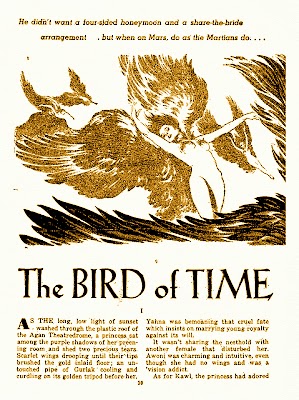VII.
“Come, fill the Cup, and in
the Fire of Spring
The Winter Garment of
Repentance fling:
The Bird of Time has but a
little way
To
fly – and Lo! the Bird is on the Wing.”*
This
verse is one of the more memorable ones and deftly encapsulates one of the
running themes of the whole collection: namely that our time here on Earth is
finite and that it should not be wasted. We are still in the Spring section of
FitzGerald’s arrangement here and like many of these verses, the tone is
imperative and urgent, calling us to hurry up or miss out. Here also is the
notion of not wasting time on regret: guilt should not weigh us down or prevent
us from moving forward; this new re-awakening allows us to cast off our old
cares and make a new start.
FitzGerald’s
later re-workings of this verse resulted in only minor alterations: “The Winter Garment” became “Your Winter Garment” and the final line
was changed to “To flutter – and the Bird
is on the Wing”. These changes arguably made the tone less pompous and
melodramatic (“Lo!”) and the use of
the pronoun makes the impact of the verse more immediate and personal; but the
meaning is not altered in any fundamental sense. Personally, I prefer “fly” to
“flutter” – because it makes that Bird of Time seem more dramatic and capable –
but, each to their own.
This
is probably a good time to discuss the other translations which FitzGerald
undertook and the differences that appear as a result. My sense is that,
whichever version of the Rubaiyat you encounter first, that’s the version you
stay with. I read the First Translation and that’s the one that feels the most
natural to me. I find that some of the later re-workings seem a bit tortured and
less spontaneous; that’s not to say that I can’t see why FitzGerald made the
alterations, it just boils down to a matter of personal preference. Take this
for example:
“Wake! For the Sun beyond
yon Eastern height
Has chased the Session of
the Stars from Night;
And to the field of Heav’n
ascending, strikes
The
Sultan’s Turret with a Shaft of Light.”
(From the Second Edition, 1868)
“Wake! For the Sun, who
scatter’d into flight
The Stars before him from
the Field of Night,
Drives Night along with
them from Heav’n and strikes
The
Sultan’s Turret with a Shaft of Light.
(From the Third, Fourth & Fifth Editions, 1872, 1879 &
1889)
Reading
through the variations, you can see the progression of thought leading to the
point where FitzGerald was finally happy with the sense of the verse. Just
being able to do this – comparing variants towards a final polished state – is just
one of the pleasures of reading the Rubaiyat.
Personally
though, the first stabs, for me, seem the more spontaneous and instinctive. I
wonder if FitzGerald felt driven by the criticism he attracted to polish,
polish, polish. I hope not; I like to think that he fiddled around with it as a
purely pleasurable exercise and I believe that he was epicurean enough for that
to have been his sole motivation.
As
we’ve seen, the Bird of Time is a living, breathing, growing sparrow; no paralysed
eagle.
*The
British writer and poet Robert Graves didn’t like this poem. Or rather, he particularly
didn’t like Edward FitzGerald, and made a point of tearing him down and nit-picking
his efforts at every opportunity. As we shall see later, he should have left
well enough alone.
With
this stanza, Graves pointed out that it derives ultimately from a poem called “Mantiq Taiyur”, penned by another
Persian poet named Attar; FitzGerald had previously translated this verse under
the title “The Bird Parliament”.
Regardless of the source, the sentiment expressed here ties in with and
supports Omar’s central theme; and since this is a free translation anyway, who
really cares if FitzGerald took a little inspiration on the side?




No comments:
Post a Comment